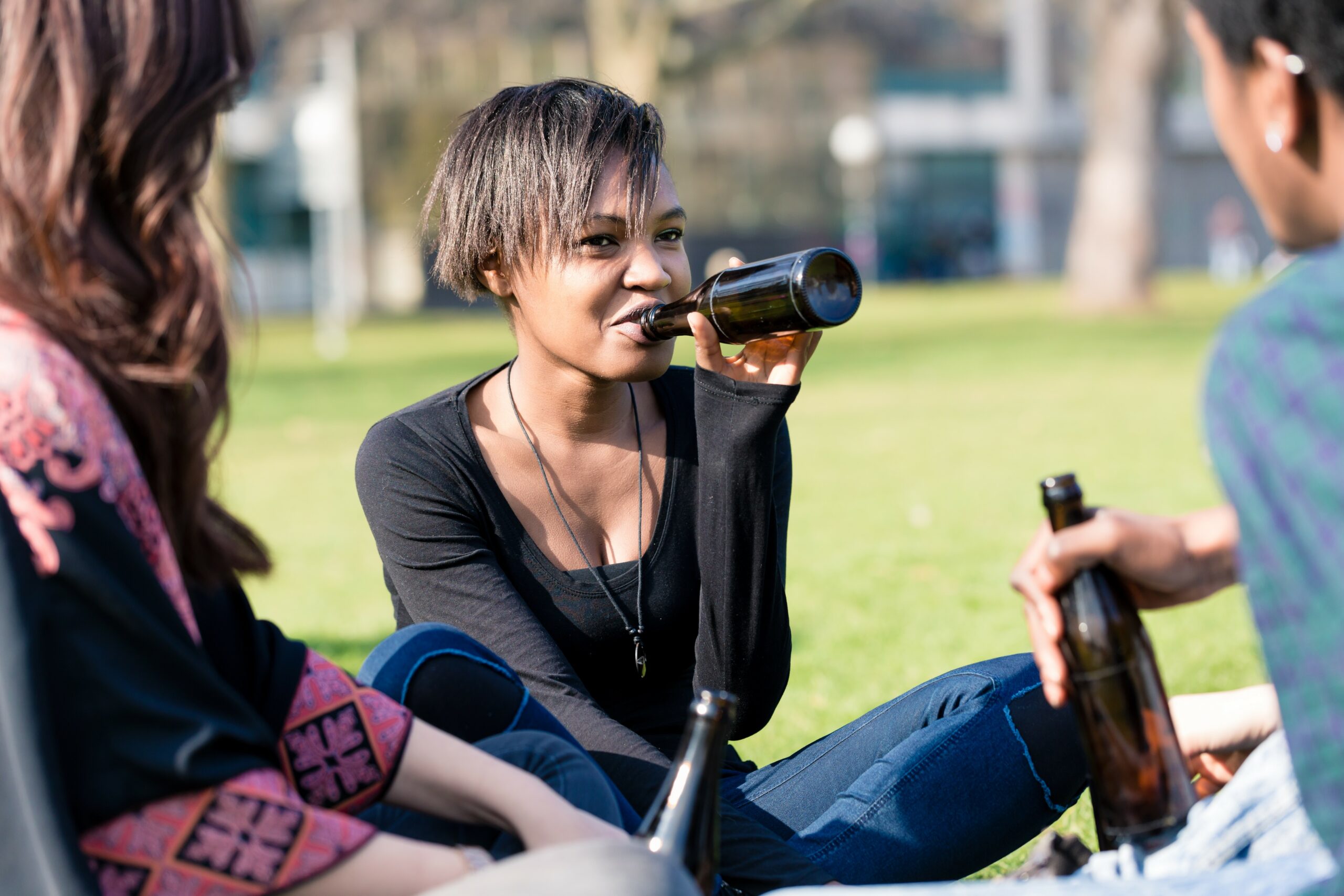Written By- Tracey Gerlach, MAPP, CTRS
How Do Alcohol and Depression Affect Teen Girls?
Alcohol and depression can be a dangerous combination for teens that can impair decision-making and can have severe effects on the brains of teenage girls that are still developing. Alcohol use, as a depressant, can exacerbate feelings of sadness and hopelessness, leading to a vicious cycle that is hard for teens to break later in life.
The impact of alcohol on the developing brain can further worsen symptoms of depression, making it harder for young girls to cope with their emotions during adolescence and potentially leading to alcohol dependence. Here’s what parents need to know about these dangerous effects.
Increased Risk of Depression with Alcohol Use
Alcohol and depression can disrupt brain chemistry and worsen depressive symptoms. Heavy drinking can elevate the risk of depression by altering serotonin levels and disrupting sleep patterns. Teen girls who consume alcohol and have depression may have worsening symptoms; if they do not have depression, they may develop symptoms.
Worsening symptoms from alcohol use and depression can have a detrimental impact on a teen girl’s overall well-being. Parents must be aware of these risks and seek appropriate interventions to support their daughters.
Impaired Decision-Making
Under the influence of alcohol, teens may engage in risky behaviors that worsen their mental health. Some of these risk behaviors could include reckless driving, unsafe sexual practices, and substance use. Alcohol misuse impairs judgment and inhibitions, making it more likely for teenage girls to make poor decisions that can have long-lasting negative consequences, including an increased risk of heart disease.
These risk behaviors from lowered inhibitions can also lead to further feelings of guilt, shame, and self-esteem issues, perpetuating the cycle of alcohol use and depression.
Dangers to The Developing Teen Brain
Alcohol and depression can have a significant impact on adolescent brains that are still developing, making them more susceptible to the negative effects of alcohol, including alcohol poisoning. Alcohol use can disrupt the normal brain development processes of teen girls. This interference can lead to long-term cognitive impairments, memory issues, and difficulties with emotional regulation.
Long-term changes can impact mental health by increasing the likelihood of developing mood disorders like depression and anxiety, as well as contributing to difficulties in coping with stress and emotional challenges. Parents play a crucial role in recognizing these dangers, including the potential for alcohol problems, and providing appropriate support and interventions to safeguard their daughter’s well-being and prospects.
By understanding the risks and taking proactive steps, parents can help mitigate the negative consequences of alcohol use on their child’s mental health and physical health, as well as their overall development.
What are the Warning Signs of Depression and Alcohol Use?
Some of the most common signs of depression and alcohol use in teen girls include withdrawal from social activities, sudden changes in behavior or mood, declining academic performance, and increased secrecy, or lying.
Depression Symptoms
Some common warning signs of depression and alcohol use can include irritability, lack of energy, difficulty concentrating, and thoughts of self-harm or suicide. If parents notice these signs in their teenage girls, seeking professional help and support is crucial. Other symptoms and signs can include:
- Persistent sadness
- Withdrawal from activities
- Changes in eating or sleeping habits
Alcohol Use Signs
Some common signs of alcohol use in teen girls include changes in behavior, secretive actions, and neglecting personal appearance. Parents should also watch out for physical signs such as bloodshot eyes, slurred speech, and the smell of alcohol on their breath. Other signs can include:
- Changes in friend groups
- Declining academic performance
- Sudden mood swings
Are Teen Girls More at Risk for Alcohol Use?
While traditionally males have been heavier drinkers, research shows that more teens and young women are starting to use alcohol.
For example, an analysis of national surveys published by the National Institute on Alcohol Abuse and Alcoholism showed that in 2018, rates of overall alcohol use among females ages 12-17 had increased and surpassed male alcohol consumption.
Teen young women may be drinking or start binge drinking to cope with the stressors of life, trying to fit in with peers, may have easy access to alcohol, and may be trying to manage new expectations of them in work or school. Sometimes teen girls may see their parent’s drinking to deal with stress or cope and may pick up this habit as a mirror of their parent’s actions.
Does Drinking Cause Depression?

Teen struggling with alcohol use and depression wonders if DBT therapy could help.
Yes, alcohol can cause or worsen depression in teens. The temporary relief provided by alcohol can lead to increased consumption and dependency.
Depression can also be triggered by drinking for teens due to the chemical imbalances in the brain. This imbalance can heighten feelings of sadness and hopelessness, Furthermore, alcohol can impair judgment and decision-making skills, leading to risky behaviors that worsen the teen’s mental health.
For example, the Society for the Study of Addiction Journal published a study that showed a high correlation between binge drinking and an increase in depressive symptoms after five years.
Moreover, drinking can become a crutch in which teens deal with depression with more alcohol use which can perpetuate a vicious cycle. Teens may find themselves caught in a pattern of drinking to alleviate emotional distress, only to find their depression deepening as a result.
Why Is Alcohol Appealing to Depressed Teens?
Depressed teens may turn to alcohol as a coping mechanism to numb emotional pain temporarily. Drinking can provide short-term relief but ultimately worsen depressive symptoms, creating a destructive cycle for teens. Other reasons alcohol can be appealing to teens include feelings of social acceptance, peer pressure, and the desire to escape from reality. The initial euphoria that alcohol brings can be alluring to teens seeking an instant mood lift. Still, they need to understand the potential adverse effects in the longer term.
Depression and alcohol use often coexist and can intensify each other’s effects. Many teens use alcohol to cope with overwhelming emotions or to self-medicate depression symptoms. However, alcohol worsens depressive symptoms and can lead to a vicious cycle of emotional distress and substance abuse.
Sad Drinking in Teen Girls
Alcohol and depression can be co-occurring. Teen girls may use alcohol to cope with feelings of sadness or depression, which can lead to unhealthy drinking habits. When faced with emotional distress, they might use alcohol as a temporary escape or a form of self-medication. This behavior could stem from societal pressures, peer influence, and the portrayal of drinking in media as a glamorous or necessary activity for fun. However, it is important to note that this type of “sad drinking” can also be a sign of underlying anxiety disorders or other mental health issues.
What Are the First Steps If I Suspect My Teen is Depressed and Drinking?
The first step if you think your teen is depressed and drinking is to talk to your daughter with empathy and openness. Here’s a step-by-step guide that can help parents, it’s important to note that if these steps have been taken and a teen is still struggling, treatment options can be a good next step.
1. Talk to Your Daughter with Empathy and Openness
Approach her without judgment to encourage open communication about alcohol and depression. Communicate by asking open-ended questions and actively listening. Create a safe and supportive environment for her to share her feelings. This can help your daughter by:
- Fostering trust and strengthening your relationship
- Allowing her to feel heard and understood
- Providing an environment where it’s safe to voice emotional struggles
2. Promote Healthy Coping Mechanisms
Encourage activities like exercise, art, or journaling as alternatives to drinking. Other activities and coping mechanisms could include practicing mindfulness, meditation, or playing a musical instrument.
3. Set Boundaries and Monitor Behavior
Establish clear expectations and consequences regarding alcohol use. Setting these boundaries could look like:
- Implementing rules around alcohol consumption
- Limiting access to alcohol at home
- Monitoring your teen’s behavior closely
What Treatment Options Are Available?
Seek professional guidance from therapists specializing in dual diagnosis (mental health and substance use). Some of the best treatment options that can help teen girls with alcohol use and depression can include integrated treatment and dialectical behavioral therapy (DBT). These treatment options can help teen girls by providing comprehensive care that addresses both mental health and substance use issues concurrently. These treatment options can also provide skills and tools that will help teens healthily navigate their emotions and behaviors.
Integrated Treatment
Integrated treatment addresses both alcohol use and underlying mental health issues simultaneously. A therapist will work with teens in integrated treatment by helping them explore the connections between alcohol use and depression, providing strategies to manage both effectively.
Dialectical Behavioral Therapy (DBT)
Teenage girls facing the challenges of depression and alcohol use require specialized support to navigate these complex issues effectively. Dialectical Behavior Therapy (DBT) offers a structured and comprehensive approach that can empower adolescent girls to manage their emotions, cope with distress, and break free from harmful patterns.
If you’d like to learn more about DBT Treatment options for alcohol use and depression, contact us or give us a call at 435-900-7753. We’ll help you find a treatment option that can help you or your teen daughter overcome substance use and depression-related mental health issues.
How DBT Addresses Alcohol Use and Depression

Teenager using DBT skills with a therapist to help with alcohol and depression.
1. Emotion Regulation
DBT teaches teens practical skills to identify, understand, and manage intense emotions without relying on alcohol. Teen girls can develop healthier coping strategies by learning emotion regulation techniques, such as mindfulness and distress tolerance.
2. Distress Tolerance
DBT equips adolescents with tools to tolerate distress and depression without turning to alcohol for relief. Techniques like deep breathing, grounding exercises, and self-soothing activities help teens navigate difficult emotions without resorting to harmful behaviors.
3. Mindfulness Practices
Mindfulness is a core component of DBT, teaching teens to cultivate present-moment awareness and acceptance of their thoughts and feelings. Mindfulness techniques reduce impulsivity and enhance emotional resilience, supporting recovery from both depression and alcohol use.
4. Interpersonal Effectiveness
DBT emphasizes communication and relationship-building skills, helping teen girls develop healthier interactions with peers and adults. Improved interpersonal skills reduce depression and related alcohol use through strengthened support networks.
Implementing DBT for Teen Girls
Introducing DBT into treatment involves a structured and collaborative approach:
- Individual Therapy: One-on-one sessions with a DBT-trained therapist to address specific issues and develop personalized treatment goals.
- Skills Training Groups: Interactive workshops where teens learn and practice DBT skills with peers.
- Family Involvement: Engaging parents or caregivers in therapy to support skill development and reinforce positive changes at home.
- Seeking Professional Guidance: If you’re concerned about a teen girl’s mental health and alcohol use, seek help from mental health professionals experienced in DBT and dual diagnosis treatment.
What Should I Do If My Teen Daughter Refuses Help or Treatment?
If your teen daughter is refusing treatment for depression and alcohol use, it’s important to continue to express your love and concern for her well-being. Keep communication lines open, validate her feelings, and try to understand her perspective without judgment. Encourage her to share what support or resources she feels would be helpful. Consider involving a trusted family member, mentor, or therapist to provide a different support network. Remember that recovery is a journey, and persistence, patience, and empathy are crucial in supporting your teen daughter through this challenging time.
- Continue to offer support and education about the risks of alcohol use.
- Consider involving other trusted adults or seeking professional advice on intervention strategies.
- Stay engaged, seek professional help when needed, and prioritize your daughter’s well-being above all else.
For more resources and support, consider reaching out to organizations specializing in adolescent and teen mental health and substance use. Your proactive approach can make a profound difference in your daughter’s journey toward healing.
Alcohol and Depression: Moving Forward
Alcohol and depression can be a difficult and co-occurring challenge for teens and their families. Dialectical Behavior Therapy (DBT) offers hope and practical solutions for teenage girls struggling with depression and alcohol use. By equipping them with essential skills in emotion regulation, distress tolerance, mindfulness, and interpersonal effectiveness, DBT empowers adolescent and teen girls to break free from harmful patterns and embrace healthier ways of coping. With the right support and guidance, teen girls can navigate their challenges and embark on a path toward recovery and resilience.
For more information or support, contact the Sunrise team at 435-900-7753. Our team will walk you through each step of finding a therapist and DBT treatment centers specializing in helping teens who are struggling with alcohol use and depression. Your proactive approach can make a positive difference in a teen girl’s life and contribute to her long-term well-being.

